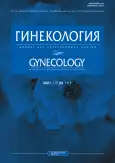New trends in current menopausal hormone therapy
- Authors: Balan V.E.1, Tikhomirova E.V.1, Zhuravel A.S.1, Titchenko J.P.1, Lovygina T.V.1
-
Affiliations:
- Moscow Regional Research Institute of Obstetrics and Gynecology
- Issue: Vol 23, No 1 (2021)
- Pages: 33-36
- Section: REVIEW
- URL: https://journal-vniispk.ru/2079-5831/article/view/63627
- DOI: https://doi.org/10.26442/20795696.2021.1.200635
- ID: 63627
Cite item
Full Text
Abstract
The article presents the results of recent studies on the effectiveness, safety and duration of menopausal hormone therapy (MHT). The main cardio-metabolic risk factors for cardiovascular diseases are formed in women precisely during the transition to menopause and are clearly associated with the appearance of vegetative menopausal symptoms and the development of endothelial dysfunction, which is a predictor of future serious health problems, especially cardiovascular diseases. The results of a number of epidemiological studies have shown that in women with severe climacteric manifestations, especially with hot flashes, the overall risk of developing cardiovascular diseases is increased. The need for early initiation of MHT is an indisputable truth and is not disputed by anyone, but the formed tendency to discontinue treatment in 5–6 years raises many questions among patients and their doctors. However, recent guidelines from the International Menopause Society state that there is no reason to arbitrarily limit the duration of MHT. This paper presents current evidence on the indications and benefits of low and ultra-low doses of MHT. In view of the high efficacy and safety of low doses of MHT, they seem to be the most acceptable starting doses of oral MHT for most women. In addition, women with early menopause should also receive higher doses of estrogens, as they are more physiological for them. The choice in favor of starting MHT in a postmenopausal woman with a low or ultra-low dose in each case should be selected individually.
Full Text
##article.viewOnOriginalSite##About the authors
Vera E. Balan
Moscow Regional Research Institute of Obstetrics and Gynecology
Author for correspondence.
Email: balanmed@gmail.com
ORCID iD: 0000-0002-2364-6838
D. Sci. (Med.), Prof.
Russian Federation, MoscowElena V. Tikhomirova
Moscow Regional Research Institute of Obstetrics and Gynecology
Email: heltik03@gmail.com
ORCID iD: 0000-0002-2977-323X
Cand. Sci. (Med.)
Russian Federation, MoscowAnastasia S. Zhuravel
Moscow Regional Research Institute of Obstetrics and Gynecology
Email: nastenka_flip@mail.ru
ORCID iD: 0000-0002-2183-4296
Cand. Sci. (Med.)
Russian Federation, MoscowJulia P. Titchenko
Moscow Regional Research Institute of Obstetrics and Gynecology
Email: yuliatit@mail.ru
ORCID iD: 0000-0003-4109-0471
Cand. Sci. (Med.)
Russian Federation, MoscowTatyana V. Lovygina
Moscow Regional Research Institute of Obstetrics and Gynecology
Email: lovygina@mail.ru
ORCID iD: 0000-0001-9804-8675
Graduate Student
Russian Federation, MoscowReferences
- Сметник В.П. От главного редактора. Климактерий. 2011; 2: 3–53 [Smetnik V.P. From the chief editor. Menopause. 2011; 2: 3–53 (in Russian)].
- Балан В.Е., Зайдиева Я.З., Петрухин В.А. Сложные вопросы терапии менопаузальных нарушений. М.: ГЭОТАР-Медиа, 2020 [Balan V.E., Zaydieva Ya.Z., Petrukhin V.A. Complex issues in the treatment of menopausal disorders. Moscow: GEOTAR-Media, 2020 (in Russian)].
- The North American Menopause Society. The North American Menopause Society Recommendations for Clinical Care of Midlife Women. Menopause 2017.
- De Villiers TJ, Gass ML, Haines CJ, et al. Global Consensus Statement on Menopausal Hormone Therapy. Climacteric 2013; 16: 203–4.
- Nachtigall LE, Nachtigall MJ. The perimenopause and vasomotor symptoms. Posgraduate Medicine. A special report. P. 5–7. doi: 10.1016/S1086-5802(16)31127-5
- The North American Menopause Society. The 2012 Hormone Therapy Position Statement of The North American Menopause Society. Menopause 2012; 19: 257.
- Avis NE, Crawford SL, Greendale G, et al. The Study of Women’s Health Across the Nation (SWAN). Duration of menopausal vasomotor symptoms over the menopause transition [published online ahead of print February 16, 2015].
- World population projected to reach 9.6 billion by 2050 with most growth in 2020 developing regions, especially Africa – say 21 June 2017, New York. Available at: https://www.un.org/development/desa/en/news/population/world-population-prospects-2017.html
- Raus K. Материалы конференции «Pres 2011 – Gynecology and Urology. Phytoneering research and experience summit». Майорка, 2011. Режим доступа: https://www.researchgate.net/topic/Phytotherapy/publications [Raus K. Materialy konferentsii «Pres 2011 – Gynecology and Urology. Phytoneering research and experience summit». Maiorka, 2011. Available at: https://www.researchgate.net/topic/Phytotherapy/publications (in Russian)].
- Gartoulla P, Worsley R, Bell RJ, Davis SR. Moderate to severe vasomotor and sexual symptoms remain problematic for women aged 60 to 65 years [published online ahead of print February 20, 2015]. Menopause. doi: 10.1097/gme.000000000000038
- Kaunitz AM, Manson JE. EDITORIAL. Failure to treat menopausal symptoms: a disconnect between clinical practice and scientific data. Menopause 2015; 22 (7): 687–8. doi: 10.1097/gme.0000000000000457
- Schneider HPG. The view of the International Menopause Society on The WHI. Climacteric 2002; 5 (3): 211–6.
- Manson JE, Chlebowski RT, Stefanick ML, et al. Menopausal hormone therapy and health outcomes during the intervention and extended poststopping phases of the Women’s Health Initiative randomized trials. JAMA 2013; 310: 1353–68.
- Stefanick ML. Menopausal Hormone Therapy and Health Outcomes During the Intervention and Extended Poststopping Phases of the Women’s Health Initiative Randomized Trials. JAMA 2013; 310: 1353–68.
- Kaunitz AM. Hormone therapy and breast cancer risk: trumping fear with facts. Menopause 2006; 13: 160–3.
- Smith GC, Wood AM, White IR, et al. Birth weight and therisk of cardiovascular disease in the maternal grandparents. Am J Epidemiol 2010; 171: 736–44.
- De Villiers TJ, Pines A, Panay N, et al. Updated 2013 International Menopause Society recommendations on menopausal hormone therapy and preventive strategies for midlife health. Climacteric 2013; 16: 316–37.
- ACOG Practice Bulletin No. 141: Management of Menopausal Symptoms. Obstet Gynecol 2014; 123: 202–16.
- Rossouw JE, Anderson GL, Prentice RL, et al. Risks and benefits of estrogen plus progestin in healthy postmenopausal women: principal results From the Women’s Health Initiative randomized controlled trial et al. JAMA 2002; 288: 321–33.
- Ettinger B, Wang SM, Leslie RS, et al. Evolution of postmenopausal hormone therapy between 2002 and 2009. Menopause 2012; 19 (6): 610–5.
Supplementary files







